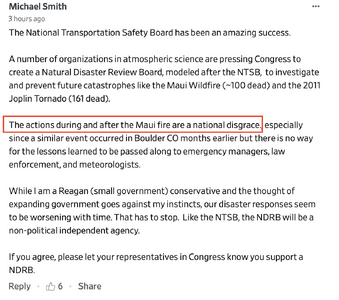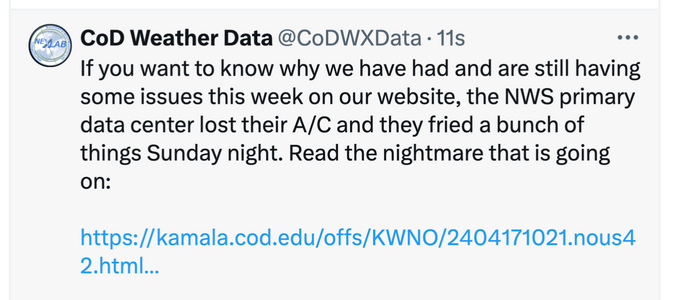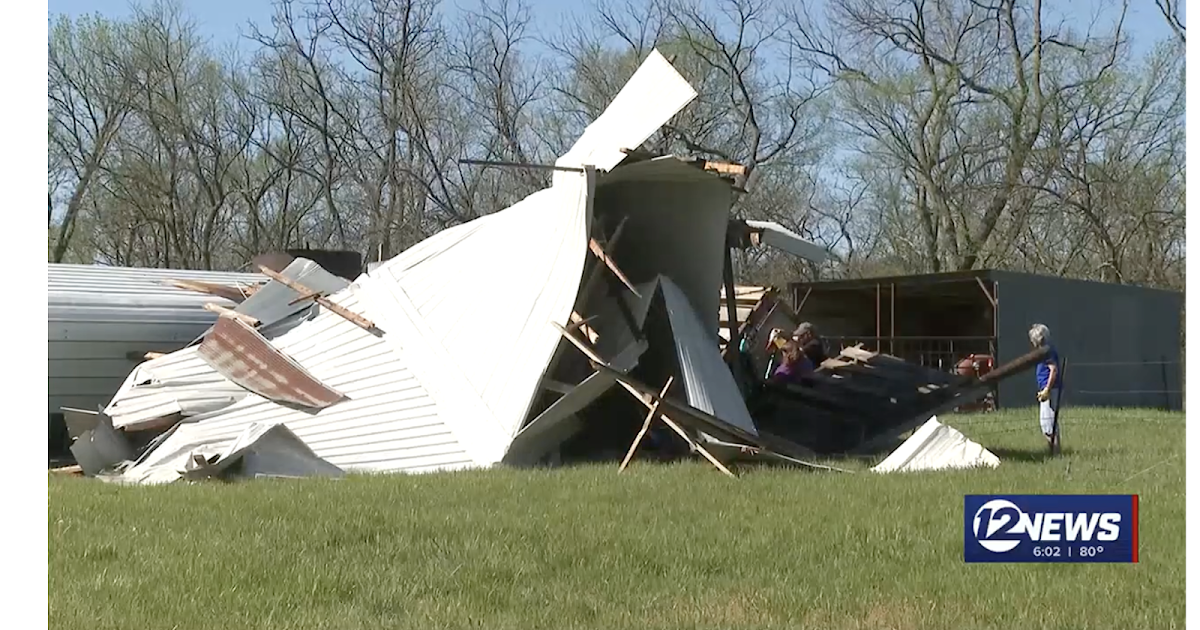Where to begin?
I am using the text of HR 6450 in what follows.
RECOMMENDATIONS
The word "recommend" appears 66 times in the text if the bill. Now, I know the purpose of any review board is to make findings, and often, to make recommendations. So, I don't think it is possible to eliminate the "recommend" function, but the scope of "recommendations" must be narrowly constrained.
Consider the case of the recent Maui wildfire. From news reports I have seen, no one has been allowed inside La Haina since the fires. Insurance companies can't get in to do assessments, and as a result, banks are foreclosing on mortgages on homes that don't exist anymore and the residents have been unable to make payments because...well...they are homeless. But, I digress.
What if the NDRB were to recommend that rebuilding not resume until some threshold of wildfire prevention (TBD) be met?
Remember, the composition of the NDRB includes those with "demonstrated knowledge in emergency management, fire management, emergency medical services, public health, physical sciences, social science, behavioral science, or architectural and engineering with post-disaster evaluation or building forensics expertise in their respective field."
- social science, behavioral science, public health: all fields of expertise that, really, are not "hard science" and have little-or-nothing to do with natural disaster warning or prevention. But these professionals can inject social engineering agendas into what should be formally a scientific exercise
Such a recommendation "not to rebuild until" could be used as a pretext for the state of Hawaii to declare that La Haina not be rebuilt: be rezoned as [parkland or non-residential, non-commercial, whatever]; or worse, the Federal government could simply seize the land. In the absence of such a recommendation by a NDRB, the political cost of the would be too high. But this kind of "recommendation" could be enough political cover to try it. Land has been seized by government for less. (It's kinda being seized right now in Maui, just by the banks with government assistance.)
Therefore: the kind of recommendations made by the NDRB should be narrowly constrained in the law to prevent this kind of overreach.
One More Example--More Specific and Less Speculative
Section 4(b)(4) [the Board] may, by a majority vote, decide to review any natural hazard incident that occurs after the date of enactment of this Act upon recommendation by the Office for the Protection of Disproportionately Impacted Communities of the Board, which the Office may make because of the incident’s impacts on populations that are socially, medically, or economically vulnerable, as decided by the Office;
First: why does the NDRB even need an
Office for the Protection of Disproportionately Impacted Communities? (Yes, it's created by this bill.)
Second: what are the definitions of "social, medical, and economic" vulnerability? (It's not defined in the bill, but it may be defined elsewhere in the US Code. I kind of doubt it, though.) Regardless--remember that, in the absence of statutory specificity, the judgment of the government official may be substituted for the legislative intent.
Third: natural disasters are not terribly specific when it comes to which communities are affected, and what is their socioeconomic status. The only limit on the review, given the broad language (
socially, medically, or economically vulnerable, as decided by the Office) would be the vote of the Board itself to accept the recommendation or not. Think of the public cost of denying such a recommendation: the accusations of bias against the "vulnerable" populations. What kind of motivation would such an Office have for making a recommendation that the NDRB set aside the statutory criteria for investigating disasters and address an event that might otherwise not meet those criteria?
Fourth: now we get to the recommendation phase, which is apart of every review. Without constraints on what kind of recommendations are permitted, it's hard to say where we will wind up here.
Oh. I Simply Can't Resist One More
7(a)(3D) a minimum of 2 members shall have demonstrated professional experience working with populations that have historically been more vulnerable to incidents because of their race, color, nationality, sex, age, disability, English proficiency, or economic status.
This can't get more political. Honestly, I hope I do not have to explain why this clause should simply be stricken from the bill. The 7-member Board constructed in this bill will simply not be able to handle the workload given its broad scope of responsibilities and requiring 2 of the 7 to have professional experience working with "historically vulnerable" populations will only make things worse.
I think I'll stop here, for now. Unless there is interest my yammering on and on on ST, I will use DM from here.



